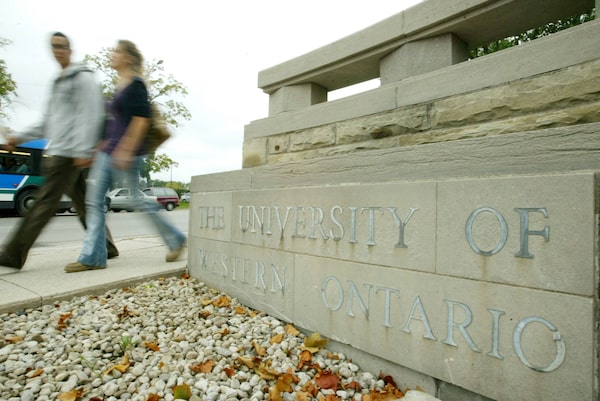
Students living in residence at the University of Western Ontario this fall will be required to be vaccinated against COVID-19.Yvonne Berg/The Globe and Mail
The University of Western Ontario will require students living in residence this fall to be vaccinated against COVID-19, the first major university in Canada to issue such a policy.
Many Canadian universities and colleges have said they are encouraging students to get vaccinated but have stopped short of making it mandatory.
Western said it is preparing for a “full return to in-person classes” and although vaccines are not required to attend classes or visit campus, students living in university residence will be required to have received at least one dose.
University president Alan Shepard said Thursday that he was strongly urged to take this step by the local health authority in London, Ont. Students are asked to get their vaccination before arriving on campus in September, or, if one is not available, to get a shot within 14 days of their arrival in residence.
Students who forgo a vaccine for reasons protected under the Human Rights Code may apply for an accommodation, the university said.
Dr. Shepard said he believes Western is the first university in Canada to introduce a vaccine requirement for its residences, but it won’t be the last.
“We’re thinking about our experience last year where we had a number of infections in residence, and we are doing everything we can to prevent that. Our number one priority is the health and safety of our students and our whole community,” Dr. Shepard said in an interview.
“More than 400 American universities have taken this step. So it’s not unprecedented in North America.”
Moderna, Pfizer, AstraZeneca or Johnson & Johnson: Which COVID-19 vaccine will I get in Canada?
Canada vaccine tracker: How many COVID-19 doses have been administered so far?
Am I eligible for a COVID-19 vaccine? The latest rules by province
Other universities have so far taken an approach focused on encouraging vaccination rather than requiring it.
Earlier this week, a group of ombudsmen from across the country urged governments to carefully consider the pitfalls of requiring people to show proof of vaccination before accessing public services.
Cara Zwibel, a lawyer with the Canadian Civil Liberties Association, said in this case Western is acting in its capacity as a landlord. The potential issues raised have more to do with privacy than constitutional rights, Ms. Zwibel said. Although the university announcement says accommodations can be requested, doing so may require that private health information be disclosed, for example, if someone has a condition or disability for which vaccines are contraindicated, she said.
The University of Waterloo said in a recent town hall with students and staff that it’s working with other universities across Canada to assess the legal issues raised by mandatory vaccination.
“All the information we have right now suggests that we will not be able to require people to be vaccinated to come to campus. That’s why we will continue to promote the need for everyone in our community to get vaccinated as soon as they are eligible,” Waterloo said on its website.
The University of British Columbia this week announced an expansion of a pilot project focused on rapid testing for COVID-19 on campus. The university has not made vaccines mandatory. In-person classes will proceed even if some people are not vaccinated, according to the UBC website.
The University of Toronto said it’s currently considering its approach to vaccination and is working with the local health authority as it assesses health and safety requirements for the fall term. The U of T said the availability of vaccines gives reason to be optimistic that students could have at least one shot by the start of the fall term.
One potential issue is that incoming international students may not have had the opportunity to be vaccinated in their home countries before arriving in Canada. At the moment, many universities are telling international students that they’ll be eligible for a shot as soon as they arrive in Canada. Students are also required to register a 14-day quarantine plan.
Matt Reesor, president of the Western University Students’ Council, said he believes the vaccine requirement will prove an effective way of keeping students and the broader community safe.
Western had outbreaks in residence in the fall of 2020 and then again in early 2021. A number of students fell ill, but fortunately none required hospital admission, Dr. Shepard said.
“We’re seeing very strong vaccine uptake amongst university-age students, so I think this will actually bring a sense of comfort and safety to those who want to come to Western and live in residence,” he said.
Our Morning Update and Evening Update newsletters are written by Globe editors, giving you a concise summary of the day’s most important headlines. Sign up today.
 Joe Friesen
Joe Friesen